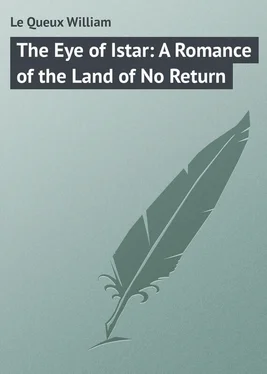William Le Queux - The Eye of Istar - A Romance of the Land of No Return
Здесь есть возможность читать онлайн «William Le Queux - The Eye of Istar - A Romance of the Land of No Return» — ознакомительный отрывок электронной книги совершенно бесплатно, а после прочтения отрывка купить полную версию. В некоторых случаях можно слушать аудио, скачать через торрент в формате fb2 и присутствует краткое содержание. Жанр: Прочие приключения, foreign_prose, на английском языке. Описание произведения, (предисловие) а так же отзывы посетителей доступны на портале библиотеки ЛибКат.
- Название:The Eye of Istar: A Romance of the Land of No Return
- Автор:
- Жанр:
- Год:неизвестен
- ISBN:нет данных
- Рейтинг книги:5 / 5. Голосов: 1
-
Избранное:Добавить в избранное
- Отзывы:
-
Ваша оценка:
- 100
- 1
- 2
- 3
- 4
- 5
The Eye of Istar: A Romance of the Land of No Return: краткое содержание, описание и аннотация
Предлагаем к чтению аннотацию, описание, краткое содержание или предисловие (зависит от того, что написал сам автор книги «The Eye of Istar: A Romance of the Land of No Return»). Если вы не нашли необходимую информацию о книге — напишите в комментариях, мы постараемся отыскать её.
The Eye of Istar: A Romance of the Land of No Return — читать онлайн ознакомительный отрывок
Ниже представлен текст книги, разбитый по страницам. Система сохранения места последней прочитанной страницы, позволяет с удобством читать онлайн бесплатно книгу «The Eye of Istar: A Romance of the Land of No Return», без необходимости каждый раз заново искать на чём Вы остановились. Поставьте закладку, и сможете в любой момент перейти на страницу, на которой закончили чтение.
Интервал:
Закладка:
To fathom the hidden secret of the Mark of the Asps I was determined, and on the hot, tedious journey across the dreary, sandy waste, infested by marauders, and known by the ominous name of Ur immandess – “He (Allah) hears not;” that is, is deaf to the cry of the waylaid traveller – I served my capricious master with patience and diligence, awaiting such time as I could seek the woman who had entranced me, and learn from her lips the strange things she had promised to reveal.
By day the journey was terribly fatiguing, but in the cool nights, when we encamped for our kayf , there was feasting, dancing and merry-making. The night hours were enlivened by Safk (clapping of hands) and the loud sounds of songs. There were many groups of dancing-girls, surrounded by crowds of onlookers. Though sometimes they performed Al-Nahl, the Bee dance, their performances were wild in the extreme, resembling rather the hopping of bears than the graceful dances of the harem, and the bystanders joined in the song – an interminable recitative, as usual in the minor key, and so well tuned that it sounded like one voice, with the refrain “La Yayha! La Yayha!” Through the brief, brilliant night always “La Yayha!”
Chapter Eleven
Tiamo the Dwarf
A whole moon passed ere the sun-whitened walls and minarets of Kano became visible. The sandy approaches of the city were strewn with bones and carcasses that had been disinterred by wild beasts, the remains of camels, horses and asses that had fallen and died in the last stages of the journey. The cities of the desert are invariably encircled by their bones, and the roads across the glaring wilderness are lined by their bodies. The sun had risen about four hours when the advance guard of the Ansar spurred hurriedly back to announce that the town was in sight, and very shortly the details of the distant shape grew clearer, and we espied a body of troops, bearing the green-and-gold standard of the Sultan, riding forth to welcome us. They were gaudily-attired in bright blue, and, as they dashed forward, indulged in their La’ab al-Barut (gunpowder play) while their bright shields and unsheathed swords flashed and gleamed in the sun, as now and then the wind parted the cloud of dust and smoke which enveloped them. The faint sound of trumpets and clash of cymbals came from the distant city, enthroned upon the horizon a dark silhouette, large and long, an image of grandeur in immensity, wherein all my hopes were centred, and as we approached we saw that Mahaza, the Grand Vizier, had been sent by the Sultan ’Othman to give us peace and conduct us into the Fada.
My master’s retinue, consisting as it did of nearly five thousand persons, was indeed an imposing one, and when an hour later we entered the city gate and passed up the hill to where the well-remembered tower of the Fada stood white against the intensely blue sky, the brass cannon mounted on the walls belched forth thundering salutes, and a cloud of soft white smoke floated up in the still, warm air. Strange it was, I reflected, that the houses of Kano everywhere displayed that essential characteristic of early Egyptian art – the pyramidal form, which represented solidity to those ancient architects. The walls of the oldest constructions had a slight inward inclination, and possessed no windows, or only the roughest sketch of them. Light and air entered through openings cut in the roof. The summits of the dwellings were ornamented by those triangular battlements which may be seen on the palaces of Rameses Meiamoun. The pylon, which is another characteristic of Egyptian architecture, gave access to the dwellings. In short, the effect of the whole, their harmonious proportions, the symmetrical distribution of their ornamental mottoes, and their massiveness, proclaimed the art of Egypt, bearing out the legend that the people of Sokoto came originally from the far east. The multitude was wild with excitement. In their eagerness to catch a glimpse of the Khalifa, world-famous for his piety and his cruelty, they rendered the streets almost impassable, shouting themselves hoarse in welcome. Blatant tam-tams beat a monotonous accompaniment to the roar of artillery, and as the Sultan’s guest, mounted on a magnificent camel at the head of his black Jihadieh, passed onward, the shout of “ Alhahu Akhbar !” rose from fifty thousand throats, echoing again and again. Progress was slow on account of the immense crowds, and even the Sultan’s spearmen, who preceded us, had considerable difficulty in clearing a path. Numbers were bruised, kicked by the horses or fatally injured by the long spears, but they were left unnoticed – a mere remark “ Umru Khalas ,” (It is the end of life) being all the sympathy ever offered. Yet the impetuous populace continued to yell enthusiastic words of welcome, the guns thundered, and the three stately men preceding the Khalifa blew long, piercing blasts on their immense onbeias fashioned from elephants’ tusks.
At length, on arrival at the great, gloomy portal of the Fada, the iron-studded gates suddenly opened, revealing the Sultan ’Othman clad in golden casque and royal robe of amaranth velvet, with a handsomely-caparisoned, milk-white horse curveting under him, and surrounded by his gaudily-attired bodyguards and mukuddums, who filled the air with their adulations, declaring that their Imperial master was Ma al-Sama (the splendour of Heaven).
Alone he came forward wishing his guest “Peace” in a loud voice, then adroitly dismounting, embraced the Khalifa. Abdullah, much pleased at this mark of respect and homage, greeted him warmly and ordered him to remount, but the Sultan remained on foot, uttering some rapid instructions to his emirs, who had also dismounted to stand beside him.
Passing through the archway into the great outer court, the Jihadieh and the Ansar remaining outside, we all dismounted with the exception of my royal master and the ladies of his harem, whose camels were led onward to the inner pavilion that had been set apart for them. As chief of the mulazimin I followed my royal master, and as we passed from court to court, Janissaries, eunuchs, slaves and courtiers made salaam and raised their voices in shouts of welcome. The reception was throughout marked by the most frantic enthusiasm, even the two gigantic negro mutes at the gate of the Imperial harem – who usually stood with drawn swords motionless as statues – raising their hands to give peace unto the great Ruler of the Soudan.
The extensive palace echoed with the sounds of feasting and merry-making. The Ansar fraternised with the Janissaries, the Jihadieh with the Sultan’s bodyguards, and the slaves of the Sultan ’Othman with those of the Ruler of the Soudan. The Khalifa, as religious head of the Dervishes and successor of the holy Mahdi, stood upon his “farwa” or white sheepskin, under the shadow of an ilex-tree in the Court of the Eunuchs, and conducted prayers in which all joined. Such was the wild fanaticism and enthusiasm that had prevailed during the firing of salutes that several men had dashed up to the very muzzles of the guns on the walls of the palace and were blown to pieces. The souls of these unfortunate people had, the Khalifa assured us, gone straight to Paradise, there to have their abode among lote-trees free from thorns, and fruitful trees of mauz, under an extended shade near a flowing water in gardens of delight, and every word that fell from his lips was regarded as the utterance of a prophet by the people as they murmured and told their beads.
After prayers, when the sura entitled “The Inevitable” had been recited, a great feast was held in the Sultan’s sumptuous pavilion. The Khalifa was seated on his Imperial host’s right hand, and over five hundred officials and courtiers were present. The dishes upon which the viands were served were of beaten gold, the goblets of chased gold studded with gems, while in the centre of the gilded pavilion a large fountain of crystal diffused a subtle perfume. Behind both the Sultan and his guest stood court tasters, who broke the seal of each dish and ate portions of the food before it was handed to their masters, lest poison should be introduced.
Читать дальшеИнтервал:
Закладка:
Похожие книги на «The Eye of Istar: A Romance of the Land of No Return»
Представляем Вашему вниманию похожие книги на «The Eye of Istar: A Romance of the Land of No Return» списком для выбора. Мы отобрали схожую по названию и смыслу литературу в надежде предоставить читателям больше вариантов отыскать новые, интересные, ещё непрочитанные произведения.
Обсуждение, отзывы о книге «The Eye of Istar: A Romance of the Land of No Return» и просто собственные мнения читателей. Оставьте ваши комментарии, напишите, что Вы думаете о произведении, его смысле или главных героях. Укажите что конкретно понравилось, а что нет, и почему Вы так считаете.












